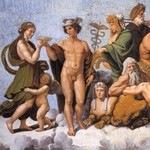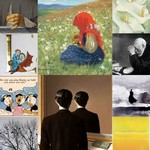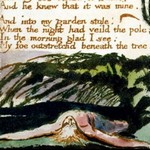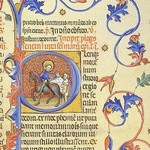- Details
 Die Götter Griechenlands is a long poem written by Friedrich von Schiller in 1788. His publication in a magazine led to a huge controversy, and the poet was accused of being heretic and atheist because of his criticism towards Christianity. Two years later, he rewrote it and the twenty-five initial verses were reduced to sixteen. He probably had more reasons but deleting the most offensive remarks suggests he wasn't indifferent to that scandal. Despite having tempered it so much, the poem was still unpleasant for many people, and when it was published in 1805 (just a few controversial pages within a volume of poetry) the book was left on the highest shelves of bookcases in many homes, thus generating a kind of "Streisand effect" in the 19th century.
Die Götter Griechenlands is a long poem written by Friedrich von Schiller in 1788. His publication in a magazine led to a huge controversy, and the poet was accused of being heretic and atheist because of his criticism towards Christianity. Two years later, he rewrote it and the twenty-five initial verses were reduced to sixteen. He probably had more reasons but deleting the most offensive remarks suggests he wasn't indifferent to that scandal. Despite having tempered it so much, the poem was still unpleasant for many people, and when it was published in 1805 (just a few controversial pages within a volume of poetry) the book was left on the highest shelves of bookcases in many homes, thus generating a kind of "Streisand effect" in the 19th century.- Details
 "Are you preparing the article about the anniversary? That of the title with numbers, right?" True-life. Yes, the day after tomorrow marks six years since I first posted; back then Liederabend was "only" this, one more on Blogger platform; In September 2013 I began to post in English and in June of 2014 I moved to this website, with many more possibilities. Thank you very much for helping me to make grow Liederabend and for celebrating with me this sixth anniversary.
"Are you preparing the article about the anniversary? That of the title with numbers, right?" True-life. Yes, the day after tomorrow marks six years since I first posted; back then Liederabend was "only" this, one more on Blogger platform; In September 2013 I began to post in English and in June of 2014 I moved to this website, with many more possibilities. Thank you very much for helping me to make grow Liederabend and for celebrating with me this sixth anniversary.During these years (and, new readers, these are the figures in the title), we heard 332 songs from 87 different composers, with poems of 164 poets; They were performed by 153 singers accompanied by 148 pianists (in[...]
- Details
 A man is furious with his enemy. He doesn't say a word because he only talks to his friends. His anger grows, and he does nothing to avoid it, on the contrary: day by day, he nourishes it with his tears and his false smiles. Eventually, it bears fruit: an apple as appetizing as poisonous. Because hatred poisons whatever it touches. The man knows that his enemy will desire that apple. He won't wait long until he discovers, pleased, his corpse in the garden.
A man is furious with his enemy. He doesn't say a word because he only talks to his friends. His anger grows, and he does nothing to avoid it, on the contrary: day by day, he nourishes it with his tears and his false smiles. Eventually, it bears fruit: an apple as appetizing as poisonous. Because hatred poisons whatever it touches. The man knows that his enemy will desire that apple. He won't wait long until he discovers, pleased, his corpse in the garden.Songs often talk about love, sadness, hope, loneliness, peace, sometimes recount funny stories and more often, terrible dramas. We see ourselves reflected in these situations because we have experienced them, [...]
- Details

P is for poetry, because there is no song without poetry. For us, literally, prima le parole, poi la musica, a poem that inspires the composer is needed to have a Lied. So, poetry couldn't be left out of Liederabend's alphabet. But how do poets arrive at those poems? Reading, of course (thank you, Captain Obvious!). But do they read to find some poems that can be musicalized? Or maybe do they read for pleasure and then a poem asks them for music?
We know that Wolf was an incurable reader of poetry and marked in his book the poems that would become music. Schumann was also a passionate about reading (he even hesitated between being a writer or a composer) and he was organized enough to write down when and where he had found that poem he had composed.
- Details

When a song has been stuck on my mind for weeks, it's time to share it with you; It's proven that talking about it is a way of getting rid of it (just to make room for a new earworm anyway). In addition, this song isn't really well-known, and maybe some of you will hear it today for the first time. Do you remember that some time ago I talked about Geheimes and its daring elegance? Well, Des Fischers Liebesglück (The fisherman’s luck in love) is somehow similar; a refined, elegant Lied and, at the same time, subtly risky.












